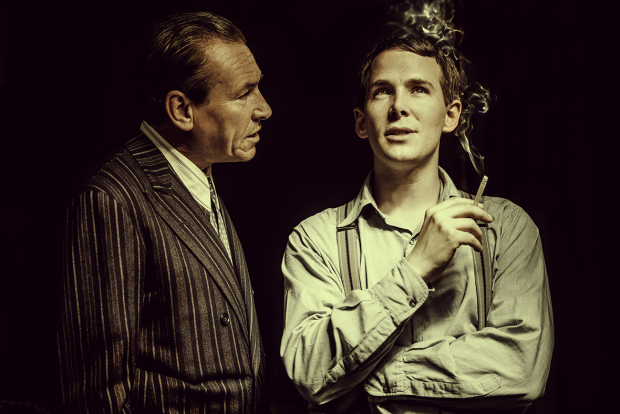Kenny Morgan (Arcola Theatre)
Mike Poulton’s new play draws on the real-life events behind Terence Rattigan’s ”The Deep Blue Sea”

© Idil Sukan
Mike Poulton's utterly engrossing new play begins, like the Terence Rattigan classic The Deep Blue Sea which inspired it, in a dingy Camden flat with the central protagonist prone in front of a gas fire in a bungled suicide attempt. In the Rattigan the principal character is Hester Collyer, who has left a comfortable middle class marriage to take up with a semi-alcoholic RAF pilot and she tries to kill herself after realising that her younger lover's ardour has cooled. In Poulton's version, the lead is the titular Kenneth Morgan, a medium-successful actor who abandoned his relationship with the real-life Rattigan in favour of a volatile liaison with a 19-year-old bi-sexual man, also a budding thespian. Unlike his fictional counterpart, the real Morgan (who starred in the film version of French Without Tears) did succeed in taking his own life in 1949, thereby giving the grief-stricken but repressed Rattigan the impetus to write the original play.
One can't help but speculate that Kenny Morgan is what Rattigan might have created had the public and legal attitudes to homosexuality been different at the time. Indeed what Poulton has written does feel rather old-fashioned, in the sense that it relies on expert storytelling, detailed characterisation, a profound and clear-eyed grasp of human relationships, fine dialogue and zero cheap gimmickry to convey what it's about. It is very much "A Well Made Play" and it is none the worse for that.
Once a huge critical and popular success, Rattigan was deemed unfashionable and staid for many years until the Almeida put him resoundingly back on the theatrical map with a stunning 1994 revival of The Deep Blue Sea starring Penelope Wilton which proved irrefutably that there was in fact a tumult of deep feeling beneath the starched shirt and stiff upper lip. In this beautiful new work, Poulton goes even further and gives us something resembling vintage Rattigan but with all the nerve endings exposed. The dialogue is sometimes bleakly funny (the scene where the monstrously self-regarding Alec bemoans the perceived selfishness of desperately unhappy Kenneth but only insofar as it inconveniences himself, or the theatre-going neighbour's star-struck reaction when meeting Rattigan) but it never rings less than true. The rare moments when the elegant articulacy gives way to incoherent rage and pain have the force of a hand grenade lobbed through a drawing room window. Poulton captures with unerring accuracy the corrosive effects of erotic obsession, and the toxicity of a dysfunctional relationship where one partner is so much more invested than the other.
Lucy Bailey's production is pretty much flawless, as is Robert Innes Hopkins' evocatively seedy set, atmospherically lit by Jack Knowles.
Paul Keating gives a career-redefining performance as Morgan: flirtatious then tremulous with self-loathing, proud then needy, desperately over-emotional and then chillingly detached. It is a hell of a role, and Keating doesn't hit a false note. He is brilliant. His exchanges with Piero Niel-Mee's deceptively puppyish but devastatingly cruel Alec are so raw as to be almost unwatchable at times, yet it is impossible to look away. Simon Dutton skilfully suggests the torment of unrequited love beneath the suavely glamorous facade Rattigan projects, determined to rescue Kenny from his rotten lot but knowing that he is ultimately doomed to fail.
There is tremendous work too from George Irving as the struck-off Doctor who saves Kenneth's life (a character lifted wholesale from the original): his paean to not giving up hope is enthralling, both in writing and delivery; and Matthew Bulgo movingly conveys the loneliness of a concerned neighbour, all understated kindness and genuine concern tempered with a sweet vulnerability. Such is the quality of the casting here that even the minor roles of a cockney landlady, comically suspicious of theatrical (i.e. gay) types but who turns out to be a gem (Marlene Sidaway), and the dismissive actress Alec briefly takes up with (Lowenna Melrose), make valuable impacts.
A play and production of this standard would not look out of place at the Almeida, the Donmar or on a main stage at the National or the RSC, and although we are not even halfway through 2016 yet, this is surely already a major contender for the accolade of best new play of the year. Unmissable.
Duration: 2 hours, 35 minutes including interval
Kenny Morgan runs at the Arcola until 18 June 2016.












